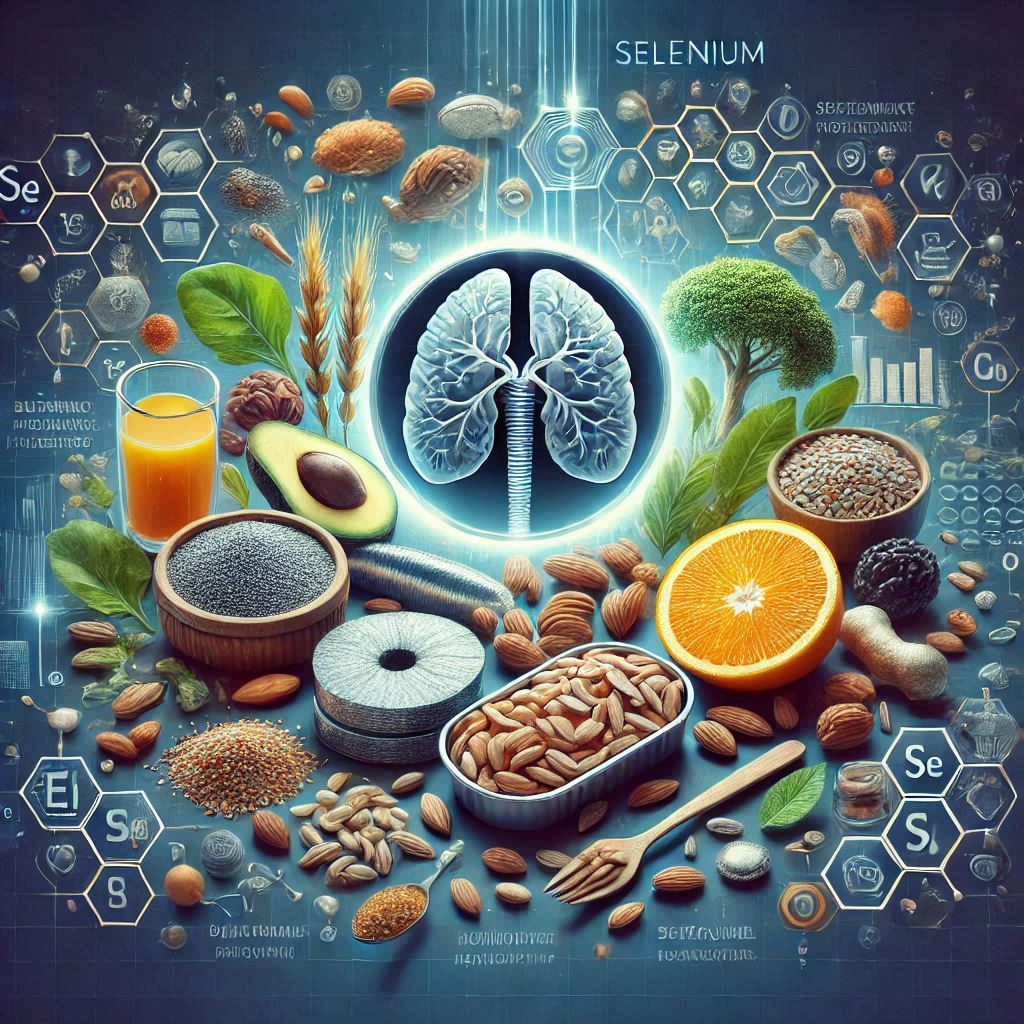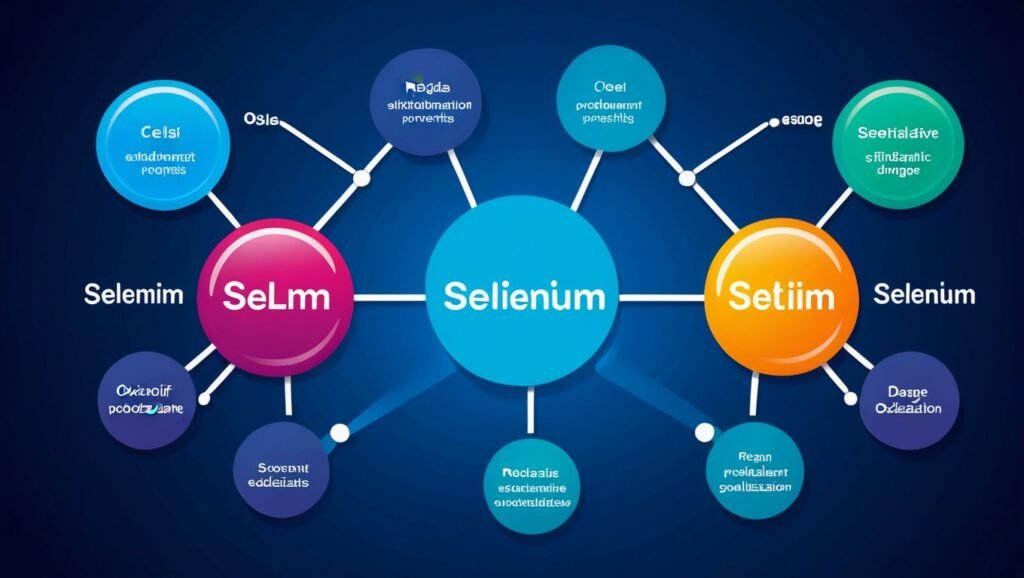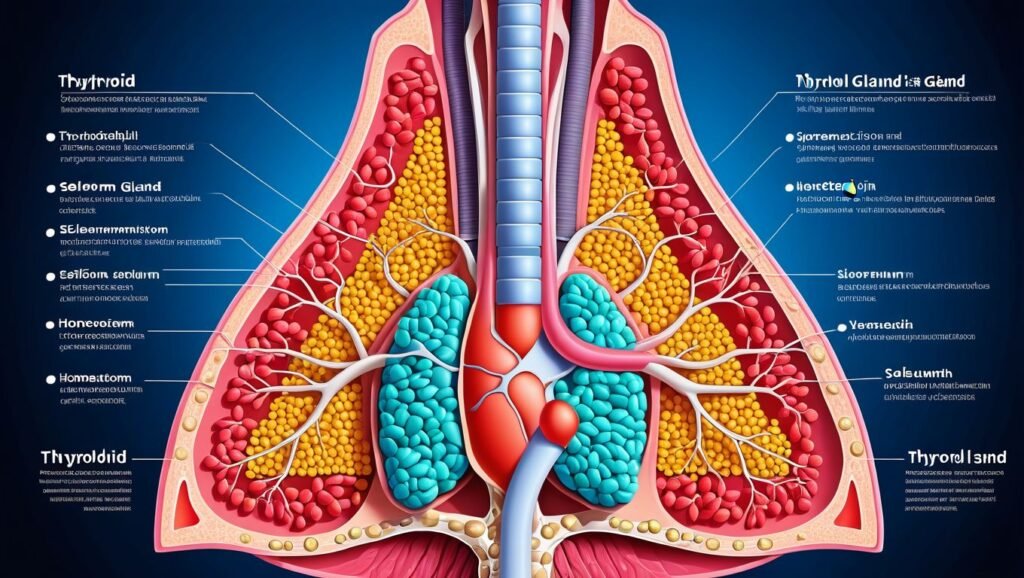
“Selenium: 10 Amazing Health Benefits”
10 Amazing Health Benefits of Selenium You Should Know
Discover how selenium can enhance your health with these 10 remarkable benefits for overall well-being and vitality.


Introduction
Brief Overview of Selenium and Its Importance
Selenium is a trace mineral that is essential for human health. Although the body only needs small amounts of selenium, it plays a crucial role in various physiological processes. Selenium is a component of selenoproteins, which are important for antioxidant defense, thyroid hormone metabolism, and immune function. It is found naturally in many foods, including Brazil nuts, seafood, meat, and grains. Ensuring adequate selenium intake is vital for maintaining overall health and preventing various diseases.
Explanation of How Selenium Supports Overall Health
Selenium supports overall health by contributing to several key bodily functions. It acts as an antioxidant, protecting cells from damage caused by free radicals. Selenium is also essential for the proper functioning of the thyroid gland, which regulates metabolism, growth, and development. Additionally, selenium boosts the immune system, helping the body fight off infections and illnesses. Its anti-inflammatory properties further contribute to reducing the risk of chronic diseases, such as heart disease and cancer.

Benefit 1: Immune Support
Role of Selenium in Boosting the Immune System
Selenium plays a vital role in enhancing the immune system. It is a key component of selenoproteins, which are involved in the production of antioxidants that protect immune cells from oxidative damage. Selenium also helps regulate the production of cytokines, which are signaling molecules that mediate and regulate immunity and inflammation. By supporting the function of immune cells, selenium helps the body respond more effectively to infections and diseases.
How Selenium Helps Fight Infections and Illnesses
Selenium’s antioxidant properties help protect immune cells from damage, ensuring they function optimally. This protection is crucial for the body’s ability to fight off infections and illnesses. Selenium also enhances the activity of white blood cells, which are essential for identifying and destroying pathogens. Studies have shown that adequate selenium levels can improve the body’s response to viral infections, such as influenza and HIV, and may even reduce the severity and duration of these illnesses.

Benefit 2: Antioxidant Properties
Explanation of Selenium’s Antioxidant Function
Selenium is a powerful antioxidant that helps protect cells from oxidative stress. Oxidative stress occurs when there is an imbalance between free radicals and antioxidants in the body, leading to cell damage. Selenium is a component of the enzyme glutathione peroxidase, which neutralizes harmful free radicals and prevents oxidative damage to cells and tissues.
How Selenium Protects Cells from Oxidative Damage
By neutralizing free radicals, selenium helps prevent cellular damage that can lead to chronic diseases, such as cancer, heart disease, and neurodegenerative disorders. Selenium’s antioxidant properties also support the body’s natural detoxification processes, helping to eliminate harmful substances and reduce inflammation. This protection is essential for maintaining overall health and preventing the onset of various diseases.

Benefit 3: Thyroid Function
Importance of Selenium for Thyroid Health
Selenium is essential for the proper functioning of the thyroid gland. The thyroid gland produces hormones that regulate metabolism, growth, and development. Selenium is a key component of the enzymes that convert the inactive thyroid hormone (T4) into its active form (T3). Without adequate selenium, this conversion process is impaired, leading to thyroid dysfunction.
How Selenium Supports Hormone Production and Metabolism
Selenium helps regulate the production of thyroid hormones, ensuring that the body maintains a healthy metabolism. Adequate selenium levels are necessary for the synthesis of selenoproteins, which protect the thyroid gland from oxidative damage. This protection is crucial for maintaining the gland’s ability to produce hormones efficiently. Selenium deficiency can lead to thyroid disorders, such as hypothyroidism and Hashimoto’s thyroiditis, which can cause symptoms like fatigue, weight gain, and depression.

Benefit 4: Heart Health
Role of Selenium in Maintaining Cardiovascular Health
Selenium plays a significant role in maintaining cardiovascular health. Its antioxidant properties help protect the heart and blood vessels from oxidative damage, reducing the risk of atherosclerosis (hardening of the arteries). Selenium also supports the production of selenoproteins that regulate inflammation and prevent the formation of blood clots.
How Selenium Reduces the Risk of Heart Disease
By reducing oxidative stress and inflammation, selenium helps lower the risk of heart disease. Studies have shown that adequate selenium levels are associated with a reduced risk of coronary artery disease, heart attacks, and strokes. Selenium’s ability to improve blood vessel function and reduce cholesterol levels further contributes to its protective effects on the cardiovascular system. Ensuring sufficient selenium intake through diet or supplements can help maintain heart health and prevent cardiovascular diseases.
Benefit 5: Cancer Prevention
Selenium’s Potential in Reducing Cancer Risk
Selenium has garnered attention for its potential role in reducing the risk of certain cancers. As an essential trace mineral, selenium contributes to the body’s antioxidant defense system, which helps protect cells from damage caused by free radicals. Free radicals are unstable molecules that can damage DNA and other cellular components, leading to the development of cancer. By neutralizing these harmful molecules, selenium helps prevent cellular damage and reduces the risk of cancer.
Studies and Research on Selenium’s Anti-Cancer Properties
Numerous studies have investigated the relationship between selenium and cancer prevention. Research suggests that adequate selenium intake is associated with a lower risk of several types of cancer, including prostate, lung, colorectal, and bladder cancer. For example, a study published in the Journal of the National Cancer Institute found that higher selenium levels were linked to a reduced risk of prostate cancer. Another study in the American Journal of Clinical Nutrition reported that selenium supplementation reduced the incidence of lung cancer in individuals with low baseline selenium levels.
While these findings are promising, it is important to note that the relationship between selenium and cancer prevention is complex and not fully understood. Some studies have shown mixed results, and more research is needed to determine the optimal dosage and long-term effects of selenium supplementation. Nonetheless, ensuring adequate selenium intake through diet or supplements may contribute to cancer prevention and overall health.
Benefit 6: Cognitive Function
How Selenium Supports Brain Health and Cognitive Function
Selenium plays a crucial role in maintaining brain health and cognitive function. It is involved in the production of selenoproteins, which have antioxidant properties that protect brain cells from oxidative stress. Oxidative stress can damage neurons and impair cognitive function, leading to conditions such as Alzheimer’s disease and other forms of dementia. By reducing oxidative damage, selenium helps preserve brain health and supports cognitive function.
Benefits of Selenium for Memory and Mental Clarity
Adequate selenium levels are associated with improved memory and mental clarity. Studies have shown that selenium deficiency can negatively impact cognitive performance, while sufficient selenium intake is linked to better cognitive function. For example, a study published in the American Journal of Epidemiology found that higher selenium levels were associated with better cognitive function in older adults. Another study in the Journal of Nutrition, Health & Aging reported that selenium supplementation improved cognitive performance in individuals with mild cognitive impairment.
In addition to its antioxidant properties, selenium also supports the production of neurotransmitters, which are essential for communication between brain cells. This helps maintain mental clarity and cognitive function, enhancing overall brain health.
Benefit 7: Anti-Inflammatory Effects
Selenium’s Role in Reducing Inflammation
Selenium has potent antiinflammatory properties that help reduce inflammation in the body. Chronic inflammation is a key factor in the development of many diseases, including heart disease, diabetes, and autoimmune disorders. Selenium helps regulate the production of inflammatory cytokines, which are signaling molecules that mediate the inflammatory response. By modulating cytokine production, selenium helps reduce inflammation and protect against chronic diseases.
How Selenium Helps Manage Chronic Inflammatory Conditions
Research has shown that selenium supplementation can help manage chronic inflammatory conditions. For example, a study published in the Journal of Clinical Endocrinology & Metabolism found that selenium supplementation reduced inflammation and improved symptoms in patients with Hashimoto’s thyroiditis, an autoimmune thyroid disorder. Another study in the European Journal of Clinical Nutrition reported that selenium supplementation reduced markers of inflammation in patients with rheumatoid arthritis.
By reducing inflammation, selenium helps alleviate symptoms and improve the quality of life for individuals with chronic inflammatory conditions. Ensuring adequate selenium intake through diet or supplements can support overall health and reduce the risk of inflammation-related diseases.
Benefit 8: Skin Health
Importance of Selenium for Healthy Skin
Selenium is essential for maintaining healthy skin. It helps protect skin cells from oxidative damage caused by free radicals, which can lead to premature aging and skin damage. Selenium also supports the production of selenoproteins, which have antioxidant properties that protect the skin from environmental stressors, such as UV radiation and pollution.
How Selenium Protects Against Skin Damage and Aging
Selenium’s antioxidant properties help protect the skin from damage and aging. By neutralizing free radicals, selenium prevents oxidative damage to skin cells, reducing the risk of wrinkles, fine lines, and other signs of aging. Additionally, selenium supports the production of glutathione peroxidase, an enzyme that helps repair damaged skin cells and maintain skin elasticity.
Research has shown that selenium supplementation can improve skin health and reduce the risk of skin conditions. For example, a study published in the Journal of Dermatological Science found that selenium supplementation improved skin elasticity and reduced the appearance of wrinkles in older adults. Another study in the Journal of Investigative Dermatology reported that selenium supplementation reduced the risk of skin cancer in individuals with a history of non-melanoma skin cancer.
Benefit 9: Selenium-Rich Foods
List of Foods High in Selenium
To ensure adequate selenium intake, it is important to include selenium-rich foods in your diet. Some of the best dietary sources of selenium include:
- Brazil nuts: one of the richest sources of selenium, with just one nut providing more than the daily recommended intake.
- Seafood: Fish and shellfish, such as tuna, salmon, and shrimp, are excellent sources of selenium.
- Meat: Beef, chicken, and turkey are good sources of selenium.
- Eggs: A versatile and nutritious source of selenium.
- Dairy Products: Milk, yogurt, and cheese contain selenium.
- Grains: Whole grains, such as brown rice, barley, and oats, provide selenium.
- Seeds and Nuts: Sunflower seeds, chia seeds, and cashews are good sources of selenium.
- Vegetables: Certain vegetables, such as spinach, broccoli, and garlic, contain selenium.
Tips for Incorporating Selenium-Rich Foods into Your Diet
Incorporating selenium-rich foods into your diet can help ensure you get enough of this essential mineral. Here are some tips to help you include more selenium in your meals:
- Snack on Brazil Nuts: Enjoy a few Brazil nuts as a snack or add them to your salads and yogurt for a selenium boost.
- Include seafood in your meals: Incorporate fish and shellfish into your diet at least twice a week to increase your selenium intake.
- Choose lean meats: Opt for lean cuts of beef, chicken, and turkey to get a good dose of selenium.
- Add Eggs to Your Diet: Enjoy eggs for breakfast or use them in various recipes to boost your selenium intake.
- Consume dairy products: Include milk, yogurt, and cheese in your diet to get selenium and other essential nutrients.
- Eat Whole Grains: Choose whole grains over refined grains to increase your selenium intake.
- Incorporate Seeds and Nuts: Add sunflower seeds, chia seeds, and cashews to your meals and snacks for a selenium boost.
- Include Selenium-Rich Vegetables: Add spinach, broccoli, and garlic to your dishes to increase your selenium intake.
Conclusion
Recap of the 10 Health Benefits of Selenium
Selenium is a vital nutrient that offers numerous health benefits, including immune support, antioxidant protection, thyroid function, heart health, cancer prevention, cognitive function, anti-inflammatory effects, and skin health. Ensuring adequate selenium intake through diet or supplements can enhance overall well-being and reduce the risk of chronic diseases.
Encouragement to Include Selenium in Your Diet for Overall Well-Being
Incorporating selenium-rich foods into your diet is an effective way to ensure you get enough of this essential mineral. By doing so, you can support your immune system, protect against oxidative damage, maintain thyroid and heart health, reduce the risk of cancer, enhance cognitive function, manage inflammation, and promote healthy skin. Remember to consult with a healthcare provider before starting any new supplement regimen to ensure it is appropriate for your individual needs.




3 Comments
Pingback:
Pingback:
Pingback: